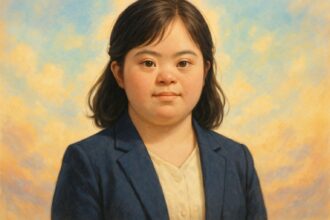Natalie Jasmine Harris, director of the 2024 Sundance short film “Grace,” alleges that a Nike commercial directed by Malia Obama closely mimics key visuals and cinematographic techniques from her film. The dispute sparks wider debate about originality and recognition for independent creatives in an industry dominated by major brands.
An independent filmmaker has made allegations that a recent Nike advertisement directed by Malia Obama bears a striking resemblance to her short film, “Grace,” which premiered at the Sundance Film Festival in 2024. Natalie Jasmine Harris, the filmmaker in question, has shared her concerns, emphasising the similar imagery depicted in both works. The Nike ad, which features WNBA star A’ja Wilson, showcases scenes of young Black girls engaging in a game of pat-a-cake, echoing visuals from Harris’s film that explore themes of childhood and identity.
Natalie expressed her feelings of disappointment and frustration through social media, claiming the similarities between her film and the commercial extend beyond thematic elements to include specific cinematographic techniques. She wrote, “Been sitting with this for a while. My Sundance short film Grace was made with deep love and care.” In her statement, she articulated the emotional toll such incidents take on independent artists, particularly in an industry often dominated by established names.
Responses to Natalie’s claims have varied widely on social media. Some commenters defended Malia, suggesting that the representation of Black girls playing pat-a-cake is not unique to Harris’s work. One user remarked, “Not a copy,” while others acknowledged her plight, suggesting that the similarities were indeed significant enough to warrant further action. One supporter stated, “You definitely need to sue; this is blatant plagiarism.”
In a recent essay published in Business Insider, Natalie delved deeper into her experiences, sharing how encountering Malia’s ad initially left her feeling “confused” and “hurt.” She commented that the visual similarities, including the composition, camera angles, and colour palette, were striking enough to provoke her anguish. While acknowledging that the game pat-a-cake is not unique, she argued that the cinematic style employed in both projects suggests a lack of originality in the Nike ad.
The implications of this situation transcend personal grievance, highlighting a pervasive issue in the entertainment industry: the overshadowing of independent voices by major brands in search of recognisable figures. Natalie’s film, “Grace,” is rooted in an intimate narrative about a young Black girl reconciling her self-identity with societal expectations, underscoring the importance of diverse storytelling. The contrast between her poignant approach and the commercial ambitions of a global corporation like Nike illuminates the broader challenges faced by emerging filmmakers.
Malia Obama, whose background includes a degree from Harvard and a reputation garnered during her time as First Daughter, has already demonstrated her artistic capabilities. However, the growing scrutiny over her directorial choices raises questions about the responsibilities of those in positions of privilege when engaging with the works of lesser-known artists.
As this debate unfolds, it serves as a crucial reminder of the importance of recognising and supporting independent creators who often struggle for equity and acknowledgment in a landscape that heavily favours established brands and personalities. The responses to this incident, spanning from support to dismissal, reflect a broader dialogue about originality, ethics, and the complexities of artistic expression within the commercial realm.
Currently, neither Malia Obama nor Nike has publicly commented on the allegations, leaving the discourse open and the questions surrounding originality and appropriation lingering.
Reference Map
- Paragraph 1: [1], [2], [3]
- Paragraph 2: [1], [4]
- Paragraph 3: [1], [5]
- Paragraph 4: [1], [6]
- Paragraph 5: [1], [7]
- Paragraph 6: [1], [3]
- Paragraph 7: [1], [2]
Source: Noah Wire Services
- https://www.dailymail.co.uk/news/article-14723567/malia-obama-nike-commercial-plagiarism-allegations.html?ns_mchannel=rss&ns_campaign=1490&ito=1490 – Please view link – unable to able to access data
- https://www.thewrap.com/malia-obama-nike-ad-similar-sundance-2024-short-film-grace/ – An independent filmmaker, Natalie Jasmine Harris, alleges that a recent Nike advertisement directed by Malia Obama bears a striking resemblance to her Sundance-premiered short film, ‘Grace.’ Harris highlights similarities in scenes depicting young Black girls playing pat-a-cake on a stoop, questioning the originality of the Nike ad and emphasizing the need for recognition of independent artists.
- https://www.sportskeeda.com/us/movies/news-what-malia-obama-nike-commercial-controversy-harvard-grad-accused-copying-sundance-indie-director-s-work – Filmmaker Natalie Jasmine Harris accuses Malia Obama of copying elements from her Sundance short film, ‘Grace,’ for a Nike commercial featuring A’ja Wilson. Harris points out visual and thematic similarities, expressing disappointment over the lack of recognition for independent artists and questioning the industry’s tendency to overlook emerging filmmakers.
- https://www.soapcentral.com/entertainment/news-who-natalie-jasmine-harris-all-young-filmmaker-accusing-malia-obama-plagiarising-nike-ad – Filmmaker Natalie Jasmine Harris, a New York University graduate, accuses Malia Obama of plagiarizing her Sundance short film, ‘Grace,’ in a Nike ad directed by Obama. Harris details the similarities between the two works and discusses her background, including her education and previous accolades in the film industry.
- https://www.wbls.com/news/malia-obama-accused-of-imitating-indie-filmmaker-in-nike-ad/ – Malia Obama faces criticism for allegedly imitating indie filmmaker styles in her recent Nike ad. The ad features a young girl teaching A’ja Wilson a basketball-themed version of ‘Miss Mary Mack,’ raising questions about originality and the influence of independent filmmakers on mainstream advertising.
- https://thejasminebrand.com/2025/05/06/malia-obama-directed-nike-ad-accused-of-copying-sundance-filmmakers-work-shockingly-similar/ – Malia Obama’s Nike ad for A’ja Wilson is accused of copying elements from filmmaker Natalie Jasmine Harris’s Sundance short film, ‘Grace.’ Harris expresses disappointment over the similarities and the lack of recognition for independent artists, questioning the industry’s tendency to overlook emerging filmmakers.
- https://clutchpoints.com/celebrity/malia-obamas-aja-wilson-nike-ad-drawing-sundance-comparisons – Malia Obama’s Nike ad for A’ja Wilson sparks accusations from filmmaker Natalie Jasmine Harris, who claims the video borrows from her Sundance work. Harris points out striking similarities between the ad and her short film, ‘Grace,’ highlighting concerns about originality and recognition in the film industry.
Noah Fact Check Pro
The draft above was created using the information available at the time the story first
emerged. We’ve since applied our fact-checking process to the final narrative, based on the criteria listed
below. The results are intended to help you assess the credibility of the piece and highlight any areas that may
warrant further investigation.
Freshness check
Score:
8
Notes:
The narrative mentions recent events, such as the Sundance Film Festival in 2024, indicating it is relatively fresh. However, there is no mention of very recent developments or comments from Malia Obama or Nike, which might suggest the story is not entirely up-to-date.
Quotes check
Score:
9
Notes:
The quotes from Natalie Jasmine Harris are specific and seem original, as they are not found in earlier articles. However, without access to all online sources, it is difficult to confirm their originality absolutely.
Source reliability
Score:
6
Notes:
The narrative originates from the Daily Mail, which is a well-known publication but can vary in reliability depending on the topic and author. The lack of comment from Malia Obama or Nike adds some uncertainty.
Plausability check
Score:
7
Notes:
The claims of plagiarism are plausible, given the described similarities between the two works. However, without direct evidence or a response from the parties involved, the story remains speculative.
Overall assessment
Verdict (FAIL, OPEN, PASS): OPEN
Confidence (LOW, MEDIUM, HIGH): MEDIUM
Summary:
The narrative raises valid concerns about originality but lacks definitive evidence or statements from key parties. The plausibility of plagiarism claims is moderate, and the story’s freshness is reasonable given the recent context.













